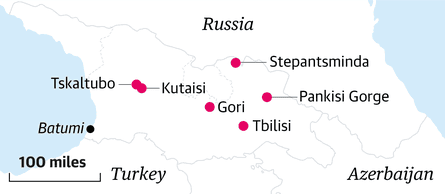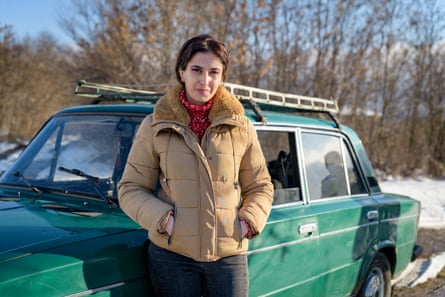Kazbegi mountains
Some Helly Hansen-clad travellers consider the Kazbegi area, next to the Russian border, one of Georgia’s more mainstream mountain trips. Don’t be put off: Stepantsminda, the main village of Kazbegi, may be frequented by tourists but it doesn’t feel overrun, and neither do its surrounding villages. Other mountainous areas, such as Svaneti, require longer slogs.

The climb from the town to the hilltop Gergeti Trinity church is the classic short Kazbegi hike, rewarded with views over the Caucasus mountains. There are great trekking trails all around, but it’s also fun to drive the winding road north of Kazbegi, stopping for jaw-dropping views of the Darial Gorge.
There’s no train line to Kazbegi, but the Georgian Military Road from Tbilisi offers one of Europe’s great road trips, passing vast, colourful Soviet-era mosaics and spectacular valleys, with the occasional herd of sheep blocking traffic. Kazbegi is worth visiting, even if you only have one spare day.

Taxi vans run to Kazbegi from Tbilisi’s Didube bus station for 15 lari (about £4.50), departing every hour (less frequently outside summer) from 8am until 7pm. The drive can take up to four hours.
Sulphur baths
Red-brick domes and warm eggy whiffs announce the historic and natural sulphur baths on the edge of Tbilisi’s old town.
Offering medieval-looking stone rooms as well as fluffy towel-laden sanctuaries, this bath house cluster has steamy sessions that can be basic or bougie. Most are still mainly visited by locals, so your dunk can feel as authentically Georgian as it is linguistically challenging. Seek Georgian or Russian language help when booking cheaper venues by phone, or prepare to be hung up on by irritated receptionists.

The bath houses also offer private rooms, which have large baths with continually flowing hot water plus a cold stone slab to lie on. Bohema Sulphur Bath, believed to be one of the first here, is an adventurous option with cheap, often dungeon-esque rooms (room hire from about £15 an hour). Chreli-Abano snags visitors with its lovely mosque-like frontage and interior mosaics (room hire from £38 an hour).
Hiring a room solo or as a couple, and floating in naked relaxation, opens pores and clears minds. To crank things up, a kisi is a skin scrape and wash-down usually administered by a brisk older therapist who is impervious to nudity-based awkwardness. In Sabir’s, the unmarked basement tea house, friendly old boys count down the day in domino clicks.
History tour
Joseph Stalin was from Gori, a small city an hour’s drive from Tbilisi, and now tourists take selfies next to statues of the Soviet dictator. Happily, there is a more considered way to explore Georgia’s history than posing with effigies.

Sick of visitors buying Stalin-branded wine from the city’s Joseph Stalin Museum, Gori-born guide and activist Zhana Odiashvili created an alternative tour (free but tips are welcome). Rather than puffed-up Stalin portraits, she shows the city walls strewn with bullets fired by Russian soldiers when they briefly invaded Gori in 2008. Keen to promote an identity beyond war, she also shows street art and galleries.
after newsletter promotion
On other tours, Odiashvili takes visitors in a vintage car to a makeshift village basement museum with scorched toy remnants of the 2008 invasion. Being in the basement within slingshot distance of South Ossetia, a Georgian region still occupied by Russian troops, underlines how relevant this recent history is for people such as Odiashvili. Ask nicely, and she might take you to the secret location where an enormous Stalin statue lies, face down, having been ripped from a Gori street in 2010.
A daily train leaves Tbilisi central at 8.50am, arriving in Gori at 10.05am (£2.40, Railway.ge). The return train leaves Gori at 4.22pm. Shared taxi vans and cars to Gori leave from Tbilisi’s Didube bus station, costing about £1.50.
Enjoy Kist hospitality

Twenty years ago, Pankisi Gorge in the north of the country, home to the mainly Muslim Kist ethnic group, was considered a no-go zone by many. During the second Chechen war (1999-2009), Chechen fighters moved to rural Pankisi, bringing a climate of violence.
With the fighters gone, Nazy Dakishvili, a former lawyer from Pankisi, began making the area more enticing for visitors, showing off warm Kist hospitality. Now her Nazy’s Guest House (rooms from around £36 a night) hosts people seeking Georgian culture beyond churches and wine. With Pankisi now completely safe, its rural beauty and the locals’ friendliness dovetail in the smattering of guesthouses opened in Dakishvili’s slipstream.
Student tour guides from the local school show off hilltop ruins, a rustic non-alcoholic beer brewery and felt-making enterprises in living rooms. Guesthouses host cooking classes teaching Kist dishes such as nettle dumplings. Horses are important to local agriculture and guides take tourists trekking on mountains flanking the valley in summer. The nags walk slowly, as befits the less chaotic pace of Pankisi life as it is now.
Taxi vans run daily from Tbilisi’s Ortachala station to Pankisi at 7.30am and 2.20pm, and cost £3. The journey takes between two to three hours; confirm times and van places with your guesthouse host.
Communist spa ruins
After the collapse of the Soviet Union in 1991, many huge hotels in Tskaltubo, once a spa resort town for the communist elite, were left to go to ruin. Thirty-two years on, their spiral staircases and ballrooms remain, stage curtains flapping in wind rushing through empty window frames.

Tskaltubo has the feel of a ghost town and is a paradise for urban explorers. Some ruins are fenced off for safety reasons. But you can still stroll into many, such as the circular bath house, where weeds now grow profusely. Travel blogger Emily Lush, based in the nearby city of Kutaisi, has created a map for the most interesting buildings, but urges visitors not to delay their visit too long: private investors are moving in and construction has followed. Many people displaced by conflict in the Abkhazia region have made homes among Tskaltubo’s derelict buildings.
A daily train to Kutaisi I station leaves Tbilisi central at 8.50am, arriving at 2.30pm (£2.70). In Kutaisi, taxi vans to Tskaltubo run from the west end of the Red Bridge between 8am and 7pm, taking 25 minutes.
 Top Naija News: Nigerian News, Breaking News Nigeria and World News Top Naija News is a daily news publication in Nigeria, delivering the latest breaking news in Nigeria and around the world.
Top Naija News: Nigerian News, Breaking News Nigeria and World News Top Naija News is a daily news publication in Nigeria, delivering the latest breaking news in Nigeria and around the world.



